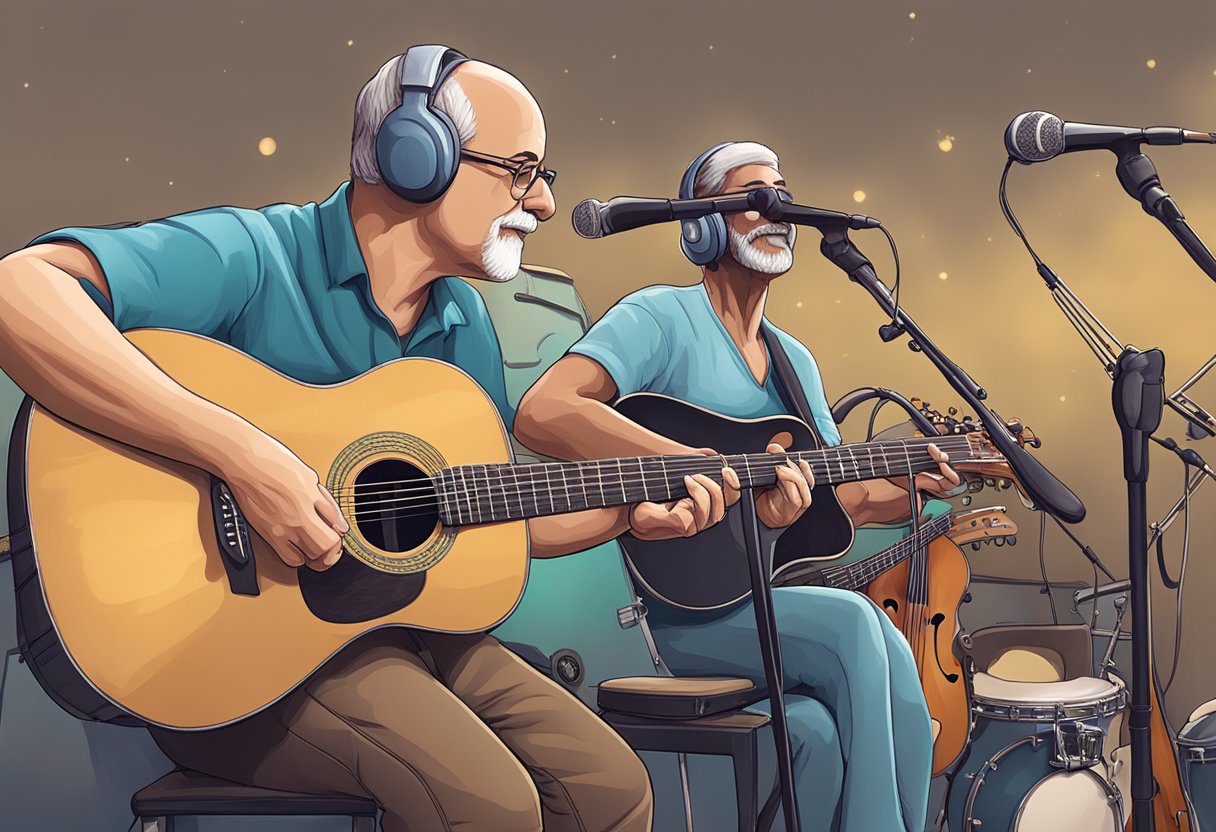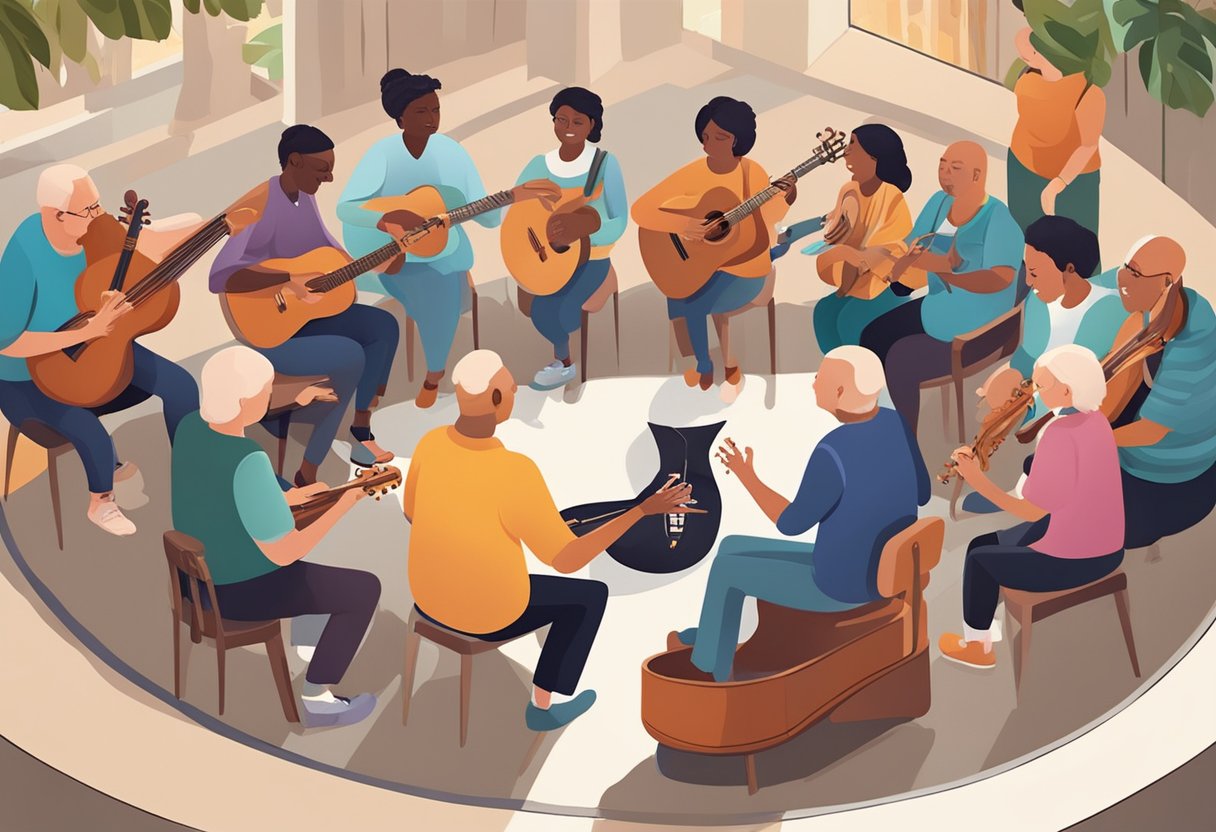Insights into Therapeutic Benefits for Cancer Survivors

Surviving lymphoma not once but twice has taught me the profound role music can play in the journey toward health and well-being. Countless fellow survivors have shared how melodies and rhythms provided a sanctuary from the rigorous treatments and emotional upheaval that accompany cancer. Indeed, music becomes a steadfast companion that can elevate mood and inspire hope.
Research affirms what many of us have felt in our bones: that music is not mere entertainment but a therapeutic ally. Trained professionals guide cancer patients through music therapy interventions, employing instrumental and vocal exercises to assist in managing symptoms and enhancing quality of life. This approach to care has been adopted more widely, a testament to its effectiveness and the comfort it brings to patients during some of the most challenging moments of their lives.
Key Takeaways
- Music therapy enhances the quality of life for cancer survivors.
- Professional interventions provide tailored support to manage symptoms.
- Ongoing research validates the efficacy of music in oncologic care.
Understanding Music Therapy

Music therapy stands as a testament to the resilience and determination many of us find necessary in the wake of a cancer diagnosis. It provides a melody of hope and a rhythm of comfort tailored to each individual’s journey.
Defining Music Therapy
As someone who has faced lymphoma head-on and emerged victorious not once but twice, I’ve experienced firsthand the profound impact that music therapy can have on a person’s wellbeing. Music therapy is an evidence-based clinical use of musical interventions to improve patient’s quality of life. After assessing their strengths and needs, healthcare professionals use it to address individuals’ physical, emotional, cognitive, and social needs.
Services range from making music to listening to it, which have been shown to alleviate pain and anxiety in men undergoing cancer treatment. This therapeutic approach taps into the innate power of music to enhance healing and promote feelings of peace and well-being.
Roles of Certified Music Therapists
My music therapists have been nothing short of angels in disguise. Certified Music Therapists are trained professionals who guide this therapeutic process. They tailor their musical approach to each patient’s needs, whether creating, singing, moving to, or listening to music. These therapists work in various healthcare contexts, including cancer recovery programs, where their skills contribute significantly to the healing process.
Their role extends beyond the music itself—they are confidants, sources of support, and champions for their patients’ emotional and psychological recovery. My therapists not only provided an outlet for expression but also stood by me, offering their skills to help me cope with the disease and the often grueling treatments that come with it.
Benefits of Music for Cancer Patients
Navigating through the journey of cancer treatment, I discovered the profound effect music had on my well-being, lessening discomfort and elevating my spirits. This isn’t just my story; many men with cancer find solace in melodies.
Alleviating Pain and Anxiety
Music became a trusted ally in my battles against pain and anxiety. Clinical studies indicate that music therapy techniques, such as instrumental improvisation and listening to music, significantly lower anxiety levels and pain perception in cancer patients. My experience echoes this, as melodies often eased my discomfort far better than I imagined.
Music’s Impact on Mood and Depression
The power of a song to uplift the mood is remarkable. Amidst my treatment, tunes often cut through the heaviness of depression, giving me moments of hope and joy. Research, including a Cochrane review, shows a positive link between music therapy and improvements in mood and symptoms of depression in adults with cancer.
Improving Communication and Emotional Expression
For men facing cancer, expressing emotions and thoughts can be a battle on its own. Music gave me a voice when words failed me. It fostered a supportive environment, enabling better communication with my loved ones and care team. Engaging in music therapy sessions can greatly enhance emotional expression, as confirmed by various findings highlighted in supportive cancer care literature.
Clinical Applications of Music in Cancer Care
Music therapy has proven to be a versatile approach in cancer care, offering substantial support during treatment, in palliative settings, and throughout the journey to recovery.
Using Music Therapy During Chemotherapy
My sessions with music therapy during chemotherapy brought a sense of relief amidst the taxing treatment. I noticed how tailored music listening and engagement diverted my focus from the discomfort and anxiety typically associated with these sessions.
In clinical settings, music therapists work alongside healthcare professionals to design individualized programs, using music as a supportive tool to manage treatment side effects and elevate a patient’s mood and mental well-being.
Incorporating Music into Palliative Care
In palliative care, comfort is a priority. I found music to be a companion that eased my journey through pain and emotional turmoil. Clinicians have observed that music interventions can reduce feelings of isolation and fear. By integrating music therapy into palliative care, caregivers can offer a layer of emotional support that resonates with the unique experiences of men enduring this critical phase of cancer care.
Support for Survivorship and Rehabilitation
Survivorship and rehabilitation can be as challenging as the initial treatment. Music therapy provided me with a robust recovery tool, aiding in restoring my physical and emotional strength. Engaging in music, whether through listening or participating in music-based activities, facilitated a connection with others and helped me regain a sense of normalcy and joy in life after cancer.
Research on Music’s Effectiveness in Cancer Therapy
As someone who has navigated the turbulent journey of lymphoma cancer not once but twice, I’ve personally felt the harmonious touch of music in the healing process. The following insight delves into the scientific backing that upholds music’s role in cancer therapy.
Analyzing Recent Medical Studies
Recent medical research illuminates the positive impact of music therapy for men like me undergoing the cancer recovery chapter. A comprehensive study indicated that music therapy contributes significantly to alleviating anxiety and pain in cancer care by addressing both physiological and psychological aspects. This evidence underscores the growing acceptance of music therapy in traditional treatment regimens to combat cancer’s taxing side effects (NCBI). Further support comes from a meta-analysis of over 9000 patients, confirming that music-based interventions can significantly lighten cancer-related symptoms (Springer).
Evidence of Physiological Benefits
Within medical research, evidence points to the physiological benefits music therapy brings. Five-element music therapy, a particular method under scrutiny, has shown potential in improving anxiety, depression, and sleep quality among cancer patients, suggesting a more comforting recovery phase (ScienceDirect). The National Institutes of Health has documented the prevalence of cancer-related fatigue; however, studies demonstrate that music interventions can significantly alleviate this fatigue, greatly enhancing quality of life during and post-treatment (Springer).
Techniques and Interventions

Having faced lymphoma head-on twice, I’ve come to learn firsthand the transformative role that music therapy can play in a survivor’s journey. The following techniques have not just been studied; I’ve felt their impact.
Group Drumming and Rhythmic Activities
Group drumming was a powerful experience for me. The drum beat acted as a heartbeat, resonating with my own. We created a shared rhythm that fostered connection among participants, all men grappling with our health battles.
- Effect: Promotes unity, communication, and self-expression.
- Activities: Syncopated beats and consistent drum patterns.
Guided Imagery with Music
Guided imagery with music guided me to visualize a journey. These sessions, backed by music, led me to envision battling and overcoming cancer. Each note played was a step toward healing.
- Process: Combine peaceful music with narrative to inspire positive imagery.
- Outcome: Aids in emotional and mental recovery.
Music-Based Relaxation and Meditation Techniques
Finally, music was a key piece of my relaxation and meditation practice. It served as a soundscape for my breathing exercises, helping me find tranquility amidst emotions and physical challenges.
- Technique: Slow tempos with gentle melodies.
- Benefit: Engenders calmness and aids in stress reduction.
Using these methods consistently has given me a toolkit not only to survive but to thrive post-cancer. For others out there, I hope my experience can shed light on paths that can lead to healing and peace.
Music as a Tool for Memory and Cognitive Functions

Music has been a steadfast ally in my journey, sharpening my mind and enriching my recollections, offering a semblance of control where it often felt like there was none.
Singing and Memory Enhancement
Singing, a joyous activity, can be a lifeline for preserving and enhancing memory. I remember melodies making it easier for me to recall experiences and information, almost as if each tune were a mnemonic device for the chapters of my life. Research has indicated that engaging in singing can trigger memory recall and foster the creation of happy memories. This reactivation of memory-engaged regions in the brain supports not only recollection but also mental clarity and concentration.
Music’s Role in Managing Alzheimer’s and Parkinson’s
The melodies that carried me through tough times also play a pivotal role for individuals facing neurodegenerative diseases such as Alzheimer’s and Parkinson’s. Music therapy is a beacon of hope, a non-pharmacological approach to stimulating cognitive performance and emotional well-being. It can help slow the cognitive decline commonly associated with these conditions. For those managing Parkinson’s, structured musical rhythms have been observed to improve gait and reduce the risk of falls, offering a harmonious blend of physical and mental support. With Alzheimer’s, familiar songs serve as anchors, holding fast to memories that might otherwise slip away.
Impact on Heart Rate, Blood Pressure, and Stress

As a two-time lymphoma survivor, I’ve experienced firsthand how music can be a powerful ally in managing heart-related health indicators and stress after cancer treatment.
Music’s Influence on Cardiovascular Health
Research indicates that engaging with music can lead to measurable benefits for heart health. After sessions of listening to classical music, for instance, I noticed a decrease in my heart rate. This echoes findings suggesting music contributes to better cardiovascular system regulation. According to studies, music can positively influence our heart rate and blood pressure, promoting relaxation crucial for recovery and overall well-being.
Cortisol Levels and Stress Reduction
The cortisol hormone, a marker for stress, tends to elevate during cancer recovery, affecting mood and physical health. In my journey, integrating soothing melodies into my daily routine became a strong defense against the weight of stress. Notable research highlights a correlation between music and reduced cortisol levels, which can lead to a more relaxed state. Benefits include emotional well-being, potentially lower blood pressure, and a stabilized heart rate, as supported by the insights from Harvard Health.
Listening to a favorite album or calming tunes can offer a moment of tranquility, aiding men like me to navigate the recovery landscape more easily. This simple, accessible practice is key in bolstering the heart’s resilience and fostering a serene mindset amid life’s challenges following cancer survival.
The Future of Music in Oncology

As a twice lymphoma survivor, I’ve experienced firsthand the transformative power of music in cancer treatment. Moving forward, the integration of music therapy in oncology represents a progressive shift towards holistic healing.
Integrative Medicine and Comprehensive Care
Integrative Medicine has reshaped health care, weaving conventional methods with complementary therapies for whole-patient wellness. In cancer centers, this approach includes music therapy, a field well-supported by clinical evidence. Studies show that involving music therapists in treatment plans can significantly ease anxiety and pain. Progress in integrative medicine means not only curative treatment for men like me but also improved quality of life during the recovery journey.
The Expanding Role of Music Therapists in Cancer Centers
No longer an afterthought, Music Therapists have become pivotal in cancer care teams. Their expertise in harnessing music’s therapeutic qualities is vital in composing personalized care. For example, a recent review found positive effects on anxiety and depression for adults undergoing cancer treatment through music interventions. This bodes well for centers committed to innovative patient support, promising a future where music therapy is as common in cancer care as chemotherapy. As a survivor, I see their role as a beacon of hope for my fellow fighters in the battle against cancer.
Final Thoughts…
Surviving lymphoma not once but twice has bestowed upon me profound insight into the resilience that we, as men facing cancer, possess. The melody of music therapy gifts us a heartfelt reprieve from our battles, an experience echoed by clinical evidence suggesting its efficacy. Within these soothing harmonies, I discovered a sanctuary where my emotions could crest and fall naturally, untethered from the stark reality of treatment.
Enveloped in rhythm, my fellow survivors and I often navigate our emotions with more grace. The strum of a guitar chord, the soft hum of a melody, it fosters connection and reduces stress — crucial companions on our journey to healing. I’ve noticed that sharing playlists and engaging in music initiatives, like the Art of Healing Program, have been a source of solace and camaraderie among my peers.
We talk less of our fears and more of our hopes within the echo of beats. Our discourse steers towards strength and recovery, establishing a foundation for hope. Boldly, I share what has carried me through: music is not just background noise; it is a healing force, a profound complement to our medical regimens, as I’ve experienced firsthand and as research at Mayo Clinic supports.
In the symphony of survival, each note plays a part — each of us, a proud melody of triumph. -T
Frequently Asked Questions
In my journey through battling and overcoming lymphoma, music therapy emerged as a potent ally, offering both psychological and physiological relief.
What are the benefits of music therapy for cancer survivors?
Music therapy aids in managing symptoms and side effects of cancer treatment, such as anxiety and pain relief. It serves as a form of expression and emotional support, helping survivors navigate the complexities of their healing journey.
How does music therapy influence mood and stress in cancer patients?
Engaging in music therapy sessions has been shown to elevate mood and decrease stress levels. The soothing power of music can offer solace, foster relaxation, and create a space for emotional release, proving essential during recovery.
Can music therapy affect cancer survival rates?
While music therapy is bound to improve quality of life, it’s not directly linked to cancer survival rates. However, a strong will to live and resilience can be nurtured through therapeutic music experiences, which indirectly contribute to overall well-being.
What types of music are considered most beneficial for healing in cancer patients?
I find that gentle, harmonious tunes resonate deeply with many men in recovery, promoting calmness and healing. However, musical preference is personal, and each individual finds solace and joy in the most healing rhythm.
How often should cancer survivors engage in music therapy to see benefits?
Consistency is key, and I recommend sessions at least once a week to maintain emotional balance and symptom management. Regular music therapy can be a continual source of comfort and strength.
Are there any specific music therapy programs or approaches recommended by experts for those recovering from cancer?
Many cancer centers and hospices offer tailored music therapy programs. Professionals often incorporate personalized sessions that cater to the unique needs of each individual, utilizing various instruments and musical styles to maximize therapeutic effects.
